University Team Development Report: Online Community Challenges
VerifiedAdded on 2022/07/28
|6
|1357
|26
Report
AI Summary
This report examines team development, focusing on the application of Belbin's and Tuckman's theories within the context of online communities. It highlights the importance of teamwork, communication, and cooperation for organizational success. The report discusses the formation of an online community team, applying Belbin's team roles and Tuckman's stages of team development to foster effective collaboration. Furthermore, it contrasts the challenges faced in online team environments, such as poor communication and lack of social interaction, with the advantages of face-to-face teams. The analysis underscores the significance of appropriate team development strategies, irrespective of the team's formation method, to mitigate common issues and achieve desired outcomes. The report concludes that while online communities offer solutions, face-to-face team formation is often easier, though both require careful application of team development theories.
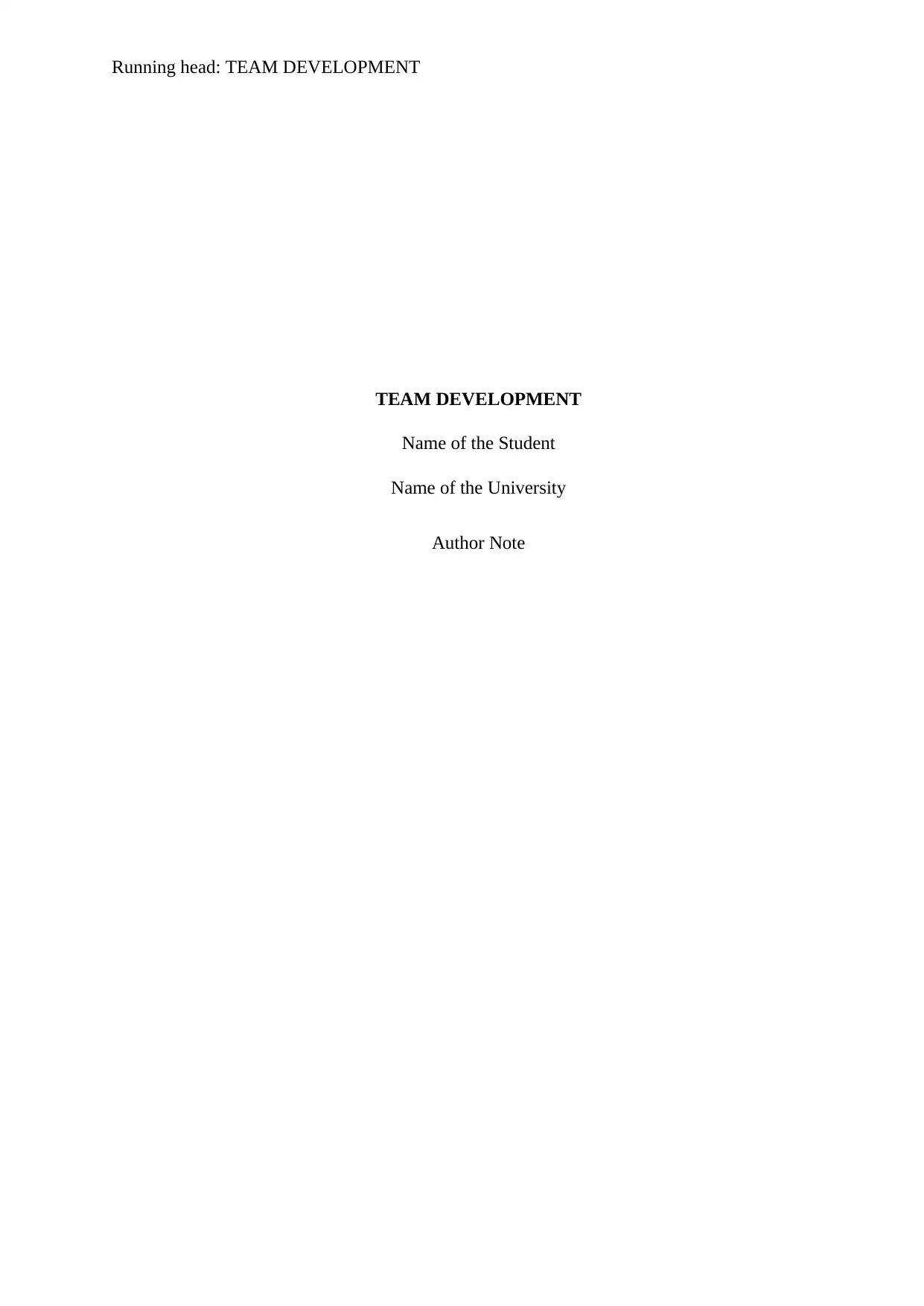
Running head: TEAM DEVELOPMENT
TEAM DEVELOPMENT
Name of the Student
Name of the University
Author Note
TEAM DEVELOPMENT
Name of the Student
Name of the University
Author Note
Paraphrase This Document
Need a fresh take? Get an instant paraphrase of this document with our AI Paraphraser
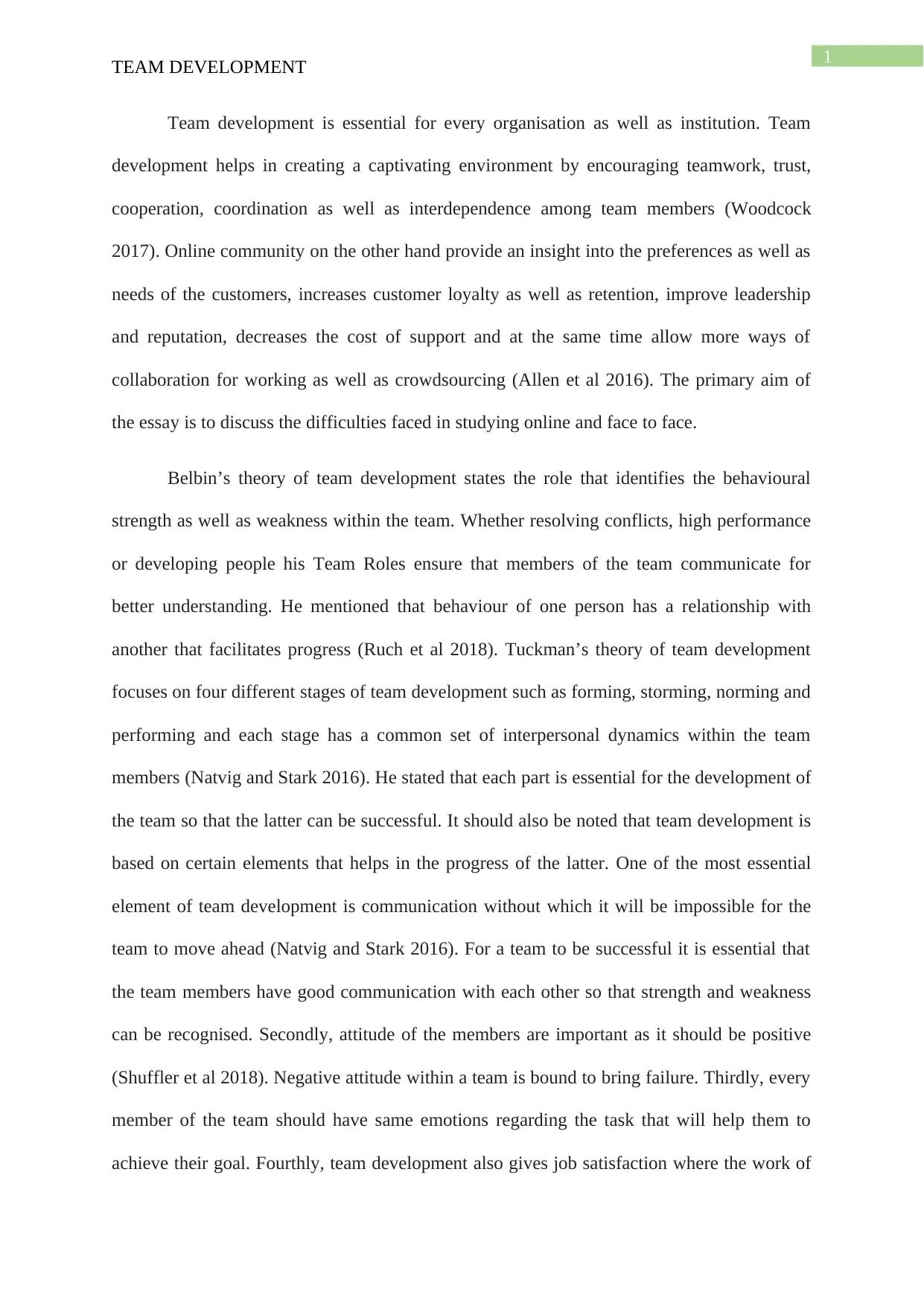
1
TEAM DEVELOPMENT
Team development is essential for every organisation as well as institution. Team
development helps in creating a captivating environment by encouraging teamwork, trust,
cooperation, coordination as well as interdependence among team members (Woodcock
2017). Online community on the other hand provide an insight into the preferences as well as
needs of the customers, increases customer loyalty as well as retention, improve leadership
and reputation, decreases the cost of support and at the same time allow more ways of
collaboration for working as well as crowdsourcing (Allen et al 2016). The primary aim of
the essay is to discuss the difficulties faced in studying online and face to face.
Belbin’s theory of team development states the role that identifies the behavioural
strength as well as weakness within the team. Whether resolving conflicts, high performance
or developing people his Team Roles ensure that members of the team communicate for
better understanding. He mentioned that behaviour of one person has a relationship with
another that facilitates progress (Ruch et al 2018). Tuckman’s theory of team development
focuses on four different stages of team development such as forming, storming, norming and
performing and each stage has a common set of interpersonal dynamics within the team
members (Natvig and Stark 2016). He stated that each part is essential for the development of
the team so that the latter can be successful. It should also be noted that team development is
based on certain elements that helps in the progress of the latter. One of the most essential
element of team development is communication without which it will be impossible for the
team to move ahead (Natvig and Stark 2016). For a team to be successful it is essential that
the team members have good communication with each other so that strength and weakness
can be recognised. Secondly, attitude of the members are important as it should be positive
(Shuffler et al 2018). Negative attitude within a team is bound to bring failure. Thirdly, every
member of the team should have same emotions regarding the task that will help them to
achieve their goal. Fourthly, team development also gives job satisfaction where the work of
TEAM DEVELOPMENT
Team development is essential for every organisation as well as institution. Team
development helps in creating a captivating environment by encouraging teamwork, trust,
cooperation, coordination as well as interdependence among team members (Woodcock
2017). Online community on the other hand provide an insight into the preferences as well as
needs of the customers, increases customer loyalty as well as retention, improve leadership
and reputation, decreases the cost of support and at the same time allow more ways of
collaboration for working as well as crowdsourcing (Allen et al 2016). The primary aim of
the essay is to discuss the difficulties faced in studying online and face to face.
Belbin’s theory of team development states the role that identifies the behavioural
strength as well as weakness within the team. Whether resolving conflicts, high performance
or developing people his Team Roles ensure that members of the team communicate for
better understanding. He mentioned that behaviour of one person has a relationship with
another that facilitates progress (Ruch et al 2018). Tuckman’s theory of team development
focuses on four different stages of team development such as forming, storming, norming and
performing and each stage has a common set of interpersonal dynamics within the team
members (Natvig and Stark 2016). He stated that each part is essential for the development of
the team so that the latter can be successful. It should also be noted that team development is
based on certain elements that helps in the progress of the latter. One of the most essential
element of team development is communication without which it will be impossible for the
team to move ahead (Natvig and Stark 2016). For a team to be successful it is essential that
the team members have good communication with each other so that strength and weakness
can be recognised. Secondly, attitude of the members are important as it should be positive
(Shuffler et al 2018). Negative attitude within a team is bound to bring failure. Thirdly, every
member of the team should have same emotions regarding the task that will help them to
achieve their goal. Fourthly, team development also gives job satisfaction where the work of
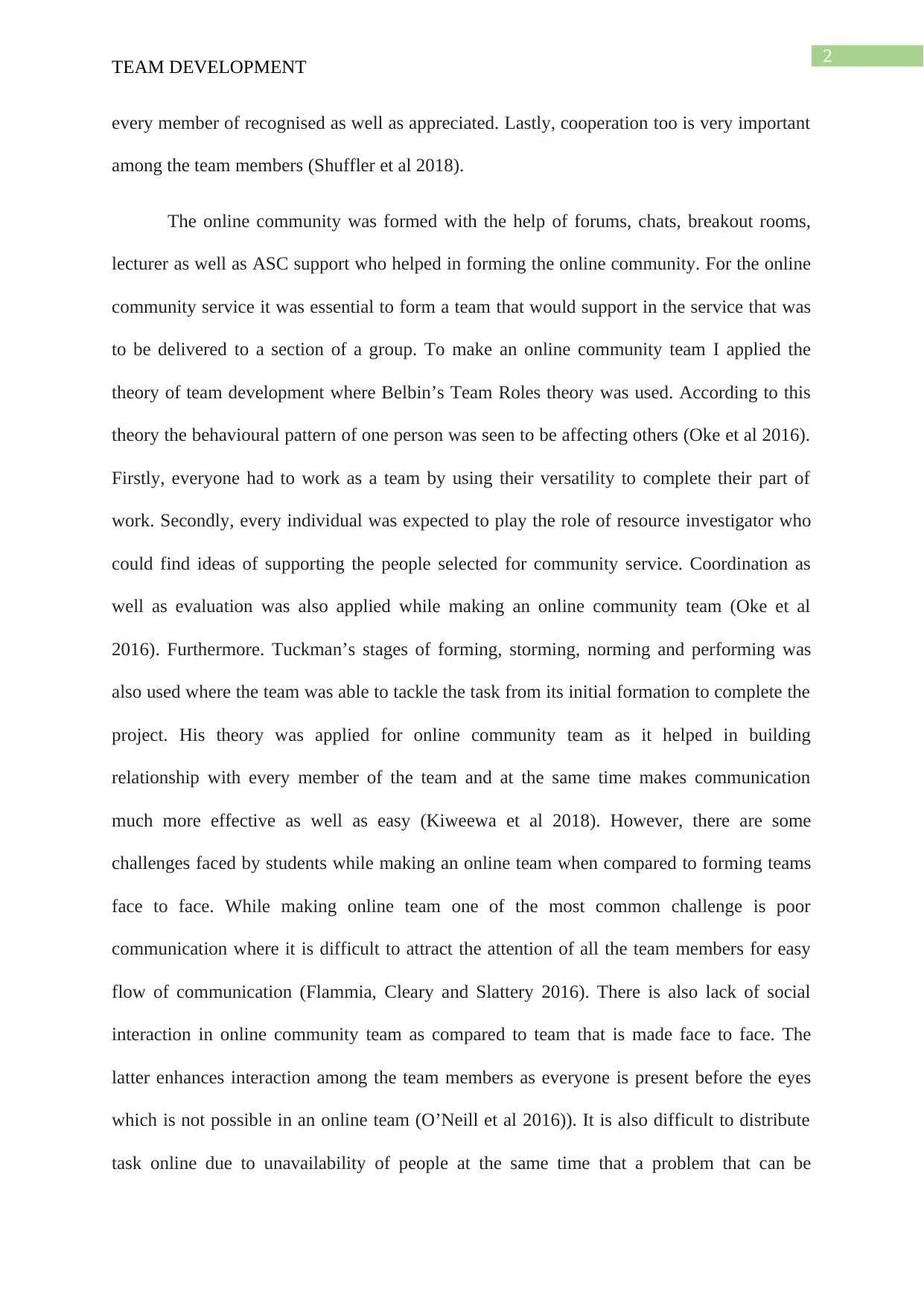
2
TEAM DEVELOPMENT
every member of recognised as well as appreciated. Lastly, cooperation too is very important
among the team members (Shuffler et al 2018).
The online community was formed with the help of forums, chats, breakout rooms,
lecturer as well as ASC support who helped in forming the online community. For the online
community service it was essential to form a team that would support in the service that was
to be delivered to a section of a group. To make an online community team I applied the
theory of team development where Belbin’s Team Roles theory was used. According to this
theory the behavioural pattern of one person was seen to be affecting others (Oke et al 2016).
Firstly, everyone had to work as a team by using their versatility to complete their part of
work. Secondly, every individual was expected to play the role of resource investigator who
could find ideas of supporting the people selected for community service. Coordination as
well as evaluation was also applied while making an online community team (Oke et al
2016). Furthermore. Tuckman’s stages of forming, storming, norming and performing was
also used where the team was able to tackle the task from its initial formation to complete the
project. His theory was applied for online community team as it helped in building
relationship with every member of the team and at the same time makes communication
much more effective as well as easy (Kiweewa et al 2018). However, there are some
challenges faced by students while making an online team when compared to forming teams
face to face. While making online team one of the most common challenge is poor
communication where it is difficult to attract the attention of all the team members for easy
flow of communication (Flammia, Cleary and Slattery 2016). There is also lack of social
interaction in online community team as compared to team that is made face to face. The
latter enhances interaction among the team members as everyone is present before the eyes
which is not possible in an online team (O’Neill et al 2016)). It is also difficult to distribute
task online due to unavailability of people at the same time that a problem that can be
TEAM DEVELOPMENT
every member of recognised as well as appreciated. Lastly, cooperation too is very important
among the team members (Shuffler et al 2018).
The online community was formed with the help of forums, chats, breakout rooms,
lecturer as well as ASC support who helped in forming the online community. For the online
community service it was essential to form a team that would support in the service that was
to be delivered to a section of a group. To make an online community team I applied the
theory of team development where Belbin’s Team Roles theory was used. According to this
theory the behavioural pattern of one person was seen to be affecting others (Oke et al 2016).
Firstly, everyone had to work as a team by using their versatility to complete their part of
work. Secondly, every individual was expected to play the role of resource investigator who
could find ideas of supporting the people selected for community service. Coordination as
well as evaluation was also applied while making an online community team (Oke et al
2016). Furthermore. Tuckman’s stages of forming, storming, norming and performing was
also used where the team was able to tackle the task from its initial formation to complete the
project. His theory was applied for online community team as it helped in building
relationship with every member of the team and at the same time makes communication
much more effective as well as easy (Kiweewa et al 2018). However, there are some
challenges faced by students while making an online team when compared to forming teams
face to face. While making online team one of the most common challenge is poor
communication where it is difficult to attract the attention of all the team members for easy
flow of communication (Flammia, Cleary and Slattery 2016). There is also lack of social
interaction in online community team as compared to team that is made face to face. The
latter enhances interaction among the team members as everyone is present before the eyes
which is not possible in an online team (O’Neill et al 2016)). It is also difficult to distribute
task online due to unavailability of people at the same time that a problem that can be
⊘ This is a preview!⊘
Do you want full access?
Subscribe today to unlock all pages.

Trusted by 1+ million students worldwide
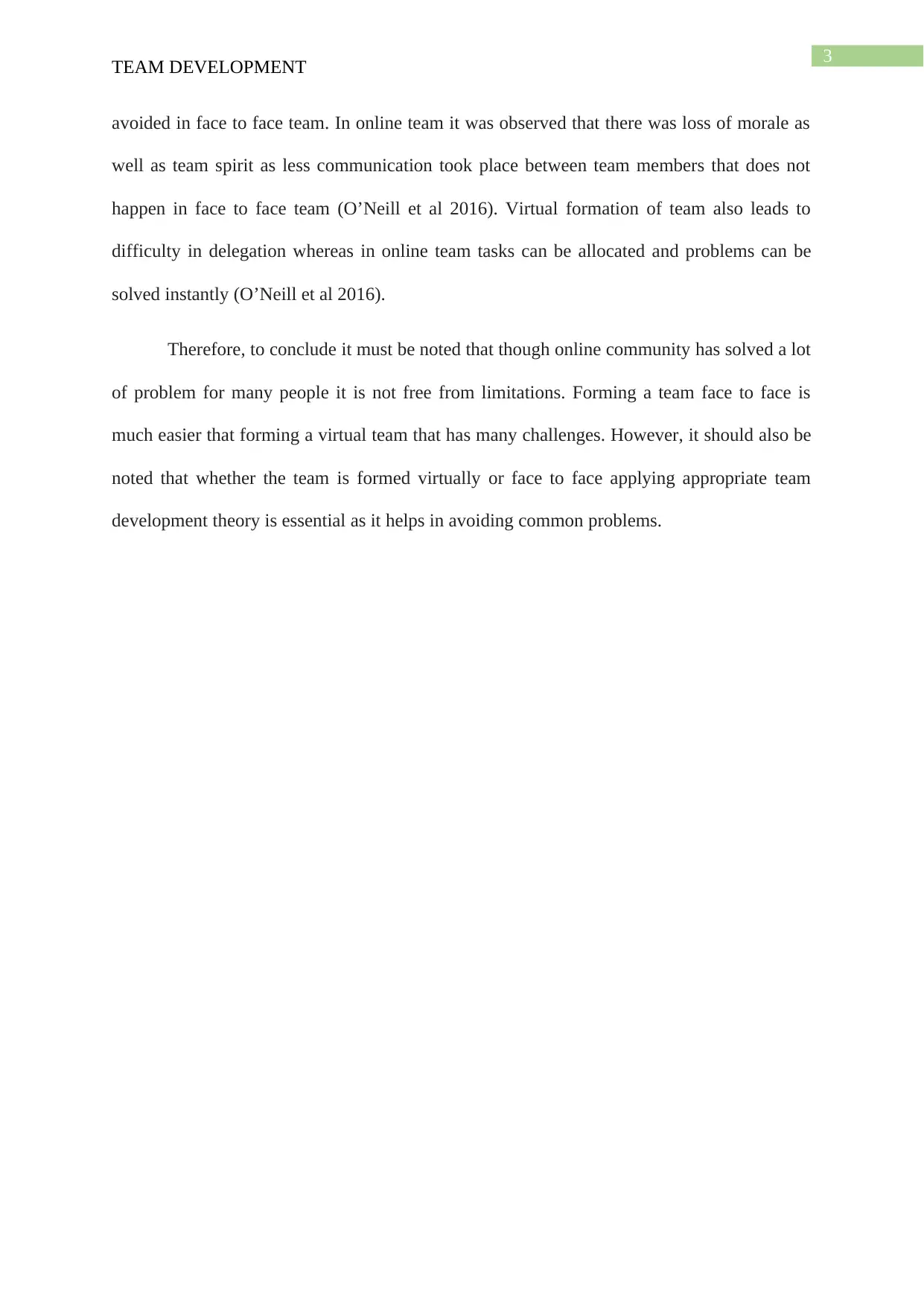
3
TEAM DEVELOPMENT
avoided in face to face team. In online team it was observed that there was loss of morale as
well as team spirit as less communication took place between team members that does not
happen in face to face team (O’Neill et al 2016). Virtual formation of team also leads to
difficulty in delegation whereas in online team tasks can be allocated and problems can be
solved instantly (O’Neill et al 2016).
Therefore, to conclude it must be noted that though online community has solved a lot
of problem for many people it is not free from limitations. Forming a team face to face is
much easier that forming a virtual team that has many challenges. However, it should also be
noted that whether the team is formed virtually or face to face applying appropriate team
development theory is essential as it helps in avoiding common problems.
TEAM DEVELOPMENT
avoided in face to face team. In online team it was observed that there was loss of morale as
well as team spirit as less communication took place between team members that does not
happen in face to face team (O’Neill et al 2016). Virtual formation of team also leads to
difficulty in delegation whereas in online team tasks can be allocated and problems can be
solved instantly (O’Neill et al 2016).
Therefore, to conclude it must be noted that though online community has solved a lot
of problem for many people it is not free from limitations. Forming a team face to face is
much easier that forming a virtual team that has many challenges. However, it should also be
noted that whether the team is formed virtually or face to face applying appropriate team
development theory is essential as it helps in avoiding common problems.
Paraphrase This Document
Need a fresh take? Get an instant paraphrase of this document with our AI Paraphraser
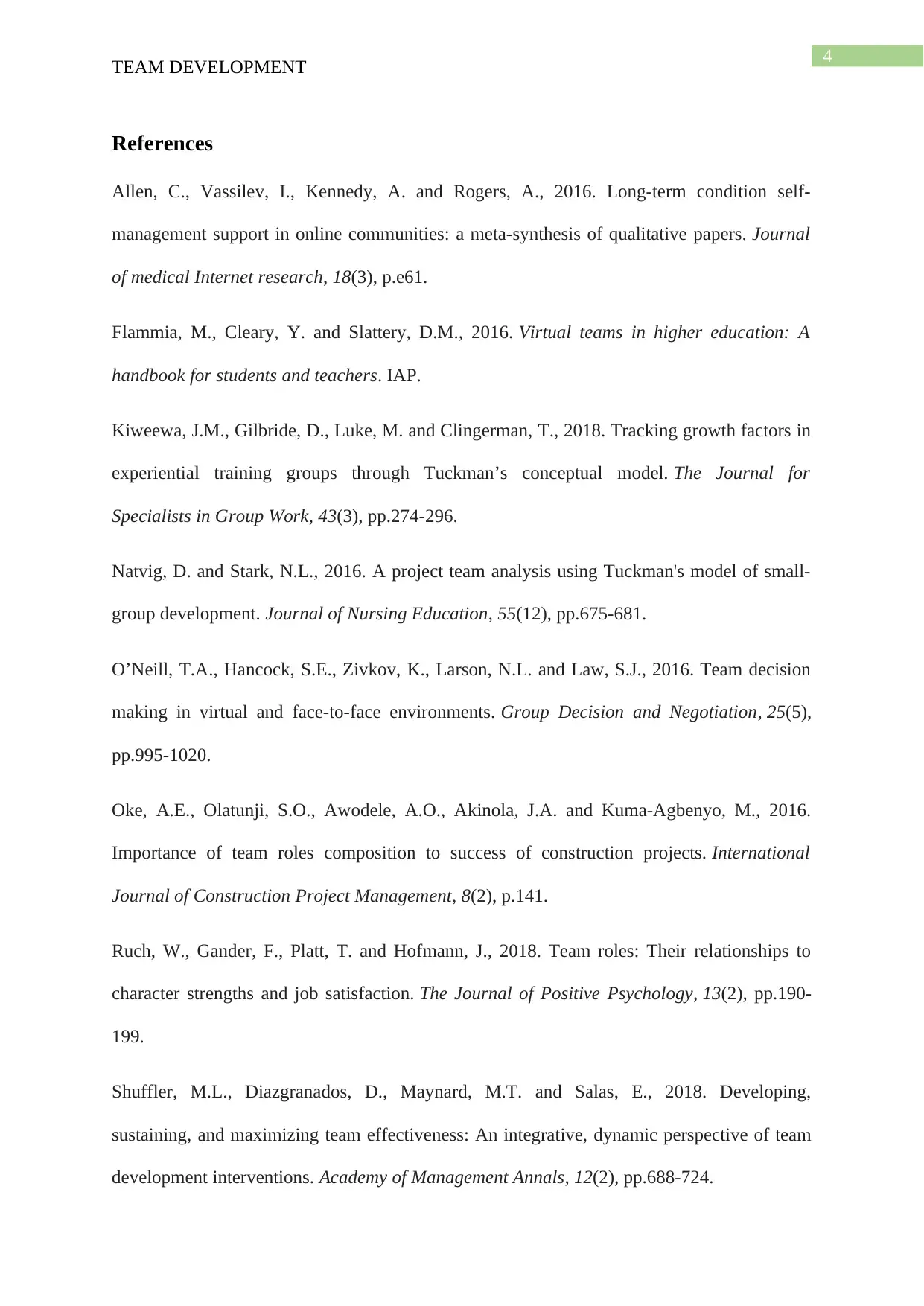
4
TEAM DEVELOPMENT
References
Allen, C., Vassilev, I., Kennedy, A. and Rogers, A., 2016. Long-term condition self-
management support in online communities: a meta-synthesis of qualitative papers. Journal
of medical Internet research, 18(3), p.e61.
Flammia, M., Cleary, Y. and Slattery, D.M., 2016. Virtual teams in higher education: A
handbook for students and teachers. IAP.
Kiweewa, J.M., Gilbride, D., Luke, M. and Clingerman, T., 2018. Tracking growth factors in
experiential training groups through Tuckman’s conceptual model. The Journal for
Specialists in Group Work, 43(3), pp.274-296.
Natvig, D. and Stark, N.L., 2016. A project team analysis using Tuckman's model of small-
group development. Journal of Nursing Education, 55(12), pp.675-681.
O’Neill, T.A., Hancock, S.E., Zivkov, K., Larson, N.L. and Law, S.J., 2016. Team decision
making in virtual and face-to-face environments. Group Decision and Negotiation, 25(5),
pp.995-1020.
Oke, A.E., Olatunji, S.O., Awodele, A.O., Akinola, J.A. and Kuma-Agbenyo, M., 2016.
Importance of team roles composition to success of construction projects. International
Journal of Construction Project Management, 8(2), p.141.
Ruch, W., Gander, F., Platt, T. and Hofmann, J., 2018. Team roles: Their relationships to
character strengths and job satisfaction. The Journal of Positive Psychology, 13(2), pp.190-
199.
Shuffler, M.L., Diazgranados, D., Maynard, M.T. and Salas, E., 2018. Developing,
sustaining, and maximizing team effectiveness: An integrative, dynamic perspective of team
development interventions. Academy of Management Annals, 12(2), pp.688-724.
TEAM DEVELOPMENT
References
Allen, C., Vassilev, I., Kennedy, A. and Rogers, A., 2016. Long-term condition self-
management support in online communities: a meta-synthesis of qualitative papers. Journal
of medical Internet research, 18(3), p.e61.
Flammia, M., Cleary, Y. and Slattery, D.M., 2016. Virtual teams in higher education: A
handbook for students and teachers. IAP.
Kiweewa, J.M., Gilbride, D., Luke, M. and Clingerman, T., 2018. Tracking growth factors in
experiential training groups through Tuckman’s conceptual model. The Journal for
Specialists in Group Work, 43(3), pp.274-296.
Natvig, D. and Stark, N.L., 2016. A project team analysis using Tuckman's model of small-
group development. Journal of Nursing Education, 55(12), pp.675-681.
O’Neill, T.A., Hancock, S.E., Zivkov, K., Larson, N.L. and Law, S.J., 2016. Team decision
making in virtual and face-to-face environments. Group Decision and Negotiation, 25(5),
pp.995-1020.
Oke, A.E., Olatunji, S.O., Awodele, A.O., Akinola, J.A. and Kuma-Agbenyo, M., 2016.
Importance of team roles composition to success of construction projects. International
Journal of Construction Project Management, 8(2), p.141.
Ruch, W., Gander, F., Platt, T. and Hofmann, J., 2018. Team roles: Their relationships to
character strengths and job satisfaction. The Journal of Positive Psychology, 13(2), pp.190-
199.
Shuffler, M.L., Diazgranados, D., Maynard, M.T. and Salas, E., 2018. Developing,
sustaining, and maximizing team effectiveness: An integrative, dynamic perspective of team
development interventions. Academy of Management Annals, 12(2), pp.688-724.

5
TEAM DEVELOPMENT
Woodcock, M., 2017. Team development manual. Routledge.
TEAM DEVELOPMENT
Woodcock, M., 2017. Team development manual. Routledge.
⊘ This is a preview!⊘
Do you want full access?
Subscribe today to unlock all pages.

Trusted by 1+ million students worldwide
1 out of 6
Related Documents
Your All-in-One AI-Powered Toolkit for Academic Success.
+13062052269
info@desklib.com
Available 24*7 on WhatsApp / Email
![[object Object]](/_next/static/media/star-bottom.7253800d.svg)
Unlock your academic potential
Copyright © 2020–2025 A2Z Services. All Rights Reserved. Developed and managed by ZUCOL.




